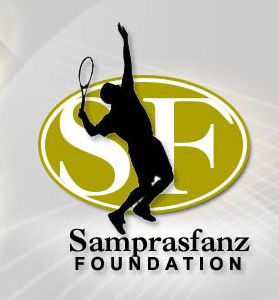Samprasfanz » Archives 2003 to 2011 » ‘Last match was best I ever played,’ says Sampras
‘Last match was best I ever played,’ says Sampras
American winner of 14 out of 18 Grand Slam finals reflects on his greatest games against Agassi and Becker
By Steve Flink in New York
23 December 2003
More than three months after officially announcing his retirement during a poignant ceremony at the United States Open, the man who created a brand of tennis unlikely ever to be replicated is certain that he made the right decision to leave the game.
Pete Sampras – winner of a men’s record 14 Grand Slam championships, a singularly gifted and ambitious individual who pushed himself to his absolute limits across a commendable career – has had time to reflect on his triumphs as he enjoys life with his wife, Bridgette, and his one-year-old son in Los Angeles.
When we spoke last week, I asked him how he wanted to be remembered. He replied: “I think of three guys sitting around and talking about tennis and one guy says he saw [Rod] Laver in his prime and he was the best. The next guy says he saw [Lew] Hoad at his best and no one was better. And then the last guy says: ‘Well, I saw Sampras and he was the best I have ever seen.’ I would just like to be in that conversation.”
That wish will surely be granted. Sampras celebrated a record six consecutive seasons (1993-98) as the world No 1. He won at least one major title for eight straight years (1993-2000), and appeared in at least one Wimbledon or US Open final for 12 of the last 13 years of his career. He was victorious in 14 of the 18 Grand Slam finals he appeared in, a big match player of unparalleled stature, and collected major titles 12 years apart (the 1990 and 2002 US Opens), a mark no other man has matched in the open era.
Many among the cognoscenti would point to 1993-97 – when he collected nine of his majors – as his prime. But Sampras contends: “The best tennis I played was when I was older. I wasn’t as consistent week in and week out but that match I played against Andre [Agassi] at the 2002 US Open – my last match ever – was the highest level I have ever played.
“Everyone was getting better when I was No 1 in the world and winning majors left and right. I was 10 times the player as I got older. When I was dominating I didn’t have any bad matches and players overall weren’t as good. The 2002 US Open Pete would beat the 1994 or 1995 Pete easily.”
Sampras clarifies why he believes he was better later in his career. “I served-and-volleyed a lot more on my second serve in the mid-to-late Nineties, and started using it more as a weapon. It was worth a few double faults to go for big second serves. The more I came in behind the second serve, the more effective a volleyer I became.”
Be that as it may, Sampras cherishes his memories from all facets of his career, and celebrates his recollections of rivalries with Agassi, Boris Becker and others. Of his 34-match, 1989-2002 series with Agassi – Sampras was victorious in 20 of those contests and was 6-0 over his chief adversary at Wimbledon and the US Open – Pete says: “Andre brought out the best in me. The bigger the match, the more confident I was, the more I believed in myself at Wimbledon or the US Open against Andre. I felt comfortable being on that big stage. I am not saying that he didn’t, but I really got going in those big matches. When I am 60 years old and looking back on my career, Andre will stand out in my mind because of the mutual respect.”
Sampras feels similarly about his riveting collisions with the burly Becker, most memorably a stupendous five-set final that the American won at the ATP Tour World Championships at Hannover in 1996. Says Sampras: “Our Hannover match was an epic. We walked out on the court and they put the bright lights on us and for a moment I was taken aback, thinking that it was cool just to be a part of it. We embraced at the net when it was over and Boris couldn’t have been any nicer. As much as the crowd wanted Boris to win, they appreciated me for being part of a great match. I have seen that tape a few times and for atmosphere it was at the top without a doubt.”
While the gripping clashes with the likes of Agassi and Becker made the journey more exhilarating for Sampras, nothing mattered more to him than the chance to triumph at the majors. He secured five titles at the US Open, and set a modern record with seven championships on the lawns of Wimbledon, including his masterpiece against Agassi in the 1999 final. Sampras always valued craftsmanship over showmanship, and the Wimbledon audiences revered him.
“I played great tennis there, got some lucky breaks and it was magical,” he recalls. “There is no other place like it. Winning there year after year, I just felt more and more respect from the fans. I did what I could to entertain them. I can’t explain it, but I felt I was born to win Wimbledon.”
The only missing piece in the Sampras collection is the French Open. He never reached a final. “I don’t know if I totally believed I was good enough on the clay,” he says. “The year I got to the semis [1996] I did start to believe but I ran into Yevgeny Kafelnikov on a hot day after three long five-set matches and hit the wall. As I got older, doubts crept in.”
Those doubts seldom surfaced anywhere else. “Staying at No 1 six years in a row was the toughest thing to do in my tennis,” Sampras asserts. “My approach to life helped me through that, not getting too high on the wins or too low on the losses. For someone like John McEnroe, who was so up and down in his emotions, it can be quite draining. I just tried to keep everything in check.”
Moreover, he found a way to conclude his career on a remarkably positive note, capturing the championship of his country in 2002 to end a 33-tournament losing streak, finishing his business with a major triumph, becoming the only player in tennis history to realise that feat. It took some deep soul-searching finally to retire, nearly a year after his victory over Agassi in New York.
“Having a two-year drought and coming back from the brink to win a major, beating Andy Roddick and then Andre in the final, really took everything out of me,” he says, “and that match with Agassi was the last drop of gas I had in my tank. I feel great about it now and am still riding a high from it. I did everything I could do at that Open. I was getting tired in the third and fourth sets against Agassi but came through in the end. I look at that symbolically.”
These days Sampras is a consultant for Tennis Magazine but does not know what else he will do in the long run. “Nothing will replace that high of walking on the Centre Court,” he muses. “Maybe in one year, or maybe in 10 years, I will say ‘Let’s make a difference’ and try to give back. I have been decompressing but I have got my eyes and ears open.”
It seemed certain that Sampras would join Agassi for a doubles match this month against McEnroe and Jimmy Connors in Las Vegas. But that exhibition will not happen. Sampras explains: “They [the promoters] could not come up with the money. I am glad it didn’t happen. I would have wanted to play well but that would have meant hitting a lot of tennis balls to prepare and that is the last thing I want to do. I haven’t played since three months before Wimbledon.”
Sampras is following today’s players with detachment. “I really don’t watch any tennis but I can imagine that [Roger] Federer has the most complete game,” he says. “He is the one guy that can do everything. Roddick is a great player but Federer is more complete and will win multiple majors I would think.”
Sampras is optimistic about the partnership of his old friend Tim Henman and his former coach Paul Annacone, who will coach the Englishman at all the Grand Slams and selected other events next year.
“It is a good call for Tim to work with Paul,” Sampras says. “Paul will help Tim mentally and strategy-wise. Maybe Paul can help Tim win Wimbledon. But ultimately, it is up to Tim to get himself in gear. I see this as a positive thing for both Paul and Tim.”
At 32, the estimable Sampras is sorting out his priorities and inevitably will take on new challenges in the years ahead. He concludes: “I feel vindicated with how my career ended. I am glad I am done and ready for the next chapter.”
Filed under: Archives 2003 to 2011










